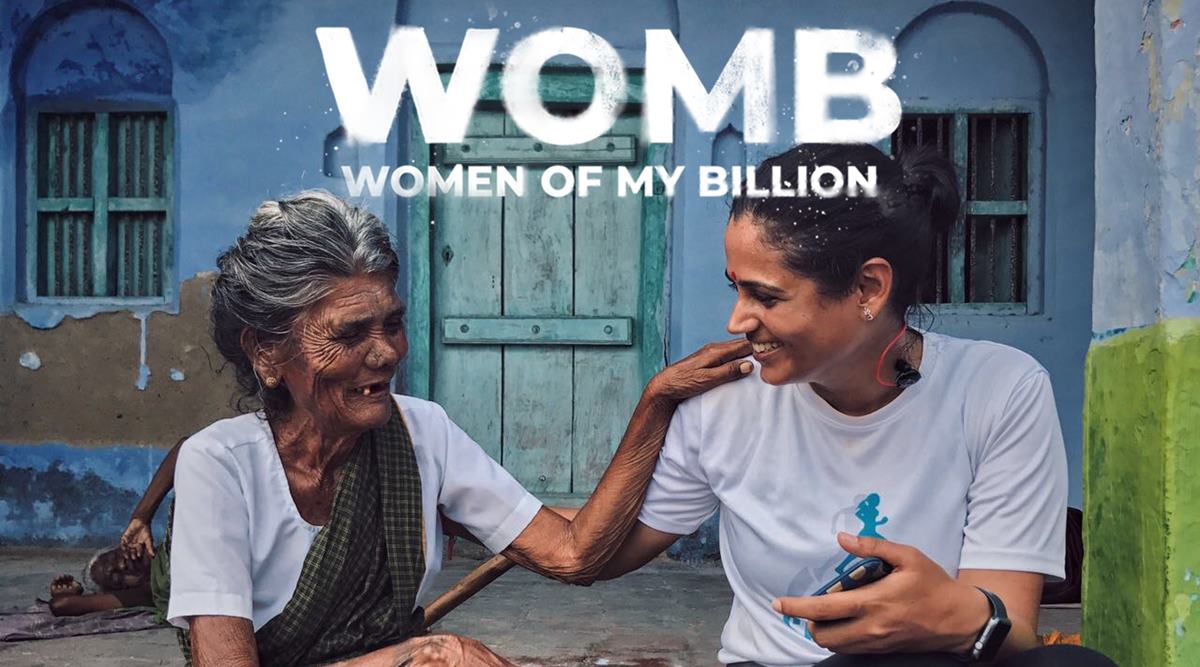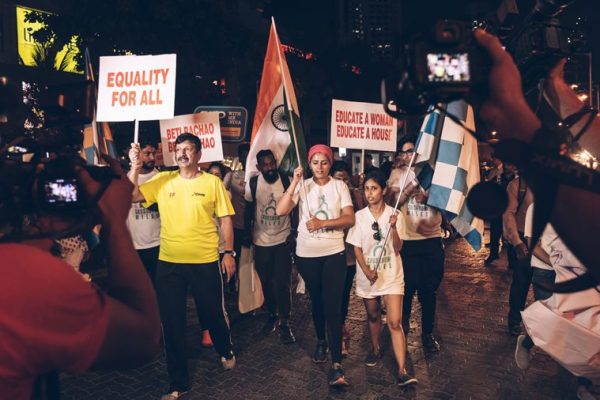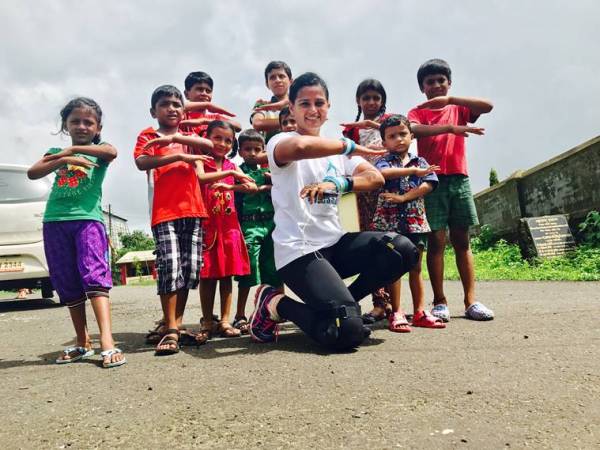 A poster of documentary WOMB: Women of My Billion.
A poster of documentary WOMB: Women of My Billion. Srishti Bakshi walks a long walk on the slate-grey tarmac with bluesy-grey skies in attendance while the weight of her distress blends seamlessly to Tajdar Junaid’s pensive strings in the documentary WOMB: Women of My Billion. Sometime in late 2016, Srishti was returning home from her corporate job in Hong Kong. Set off by global conversations around how unsafe India is for women, and inconsolable after the news of the 2016 highway-91 (Delhi-Kanpur) mother-daughter gang rape case in Bulandshahr, Uttar Pradesh, kilometres away from her Delhi home, she decided to not be an armchair activist. A fatigue had set in among her friends and cousins, every time she’d speak to them about rapes in India. Srishti came home, to go on a long walk.
🗞️Subscribe Now: Get Express Premium to access the best Election reporting and analysis🗞️
“In an ideal world, this conversation about safety, women empowerment and gender parity should happen in every household, but it’s not the case. So, people who are privileged, like us, do feel that our privilege is also our responsibility,” she says about the film.
For 230 days, 3,800 km, from Kanyakumari to Srinagar, on foot, in 2018, she met women, from different walks of life, united in their ordeals of gender-based violence. It became a movement, called CrossBow Miles, amplified on social media. Often women would join her for night walks. Srishti’s walk and encounters were turned into a feature-length documentary by director Ajitesh Sharma and producer Apoorva Bakshi, the latter produced the Netflix Original Delhi Crime, a show born out of the 2012 Delhi gang rape, which won India its first web-series Emmy in 2020. WOMB… had its world premiere at the 12th Bagri Foundation London Film Festival in June last year, and is now streaming for 48 hours, till March 7 (noon), as part of the Gala Premieres at 22nd Jio MAMI Mumbai Film Festival ’s online screenings.
 A scene from the documentary WOMB: Women of My Billion.
A scene from the documentary WOMB: Women of My Billion. The film cross-cuts between the stories of rural women and three urban women, whose specific stories tie up the general narrative of India. Pragya Prasun is an acid-attack survivor, Sangeeta Tiwari is a widow who wasn’t allowed to take decisions about her own life for 35 years, and Neha Rai is a domestic-violence and marital-rape survivor. They faced sexual abuse, by their uncles, or tuition teachers, or husbands (India has still not criminalised marital rape). Wresting agency of their lives, they chose a life of dignity, for themselves and others. President’s Awardee Prasun founded Atijeevan Foundation to support burn and acid-attack survivors, Tiwari, an army doctor, sensitises young girls in Rajasthan.
When Srishti was crossing through Delhi, on her walk, in 2018, she went and met sister Apoorva and Sharma, the latter was an assistant director on Delhi Crime, who were shooting the Netflix show in Delhi. Sharma was “shocked, blown away” on hearing Srishti’s stories, and seeing the footage. “The thought didn’t leave me. I told Apoorva, there should be a film, I felt very strongly about it,” says Sharma.
“The aim was actually not to create a documentary. It was documentation,” says Srishti. Apoorva had sent a camera team to record the walk. “Apoorva told me documenting was very important, because it’s 230 days, one didn’t know what would happen in this time, sometimes, you will forget and we should not forget the women I’d be meeting, what they’d be communicating to me,” adds Srishti, who was steered by an army of people, including her ex-Army officer father who planned the walk; the state machinery facilitated, as did corporate aid to impart digital financial literacy and tools to women who’ve had no formal education. In 2017, Srishti got approved as a UN Women Changemaker and began her year-long walk.
“It is my first involvement in a movement,” says Sharma, who was given 1,000 hours of footage, with some 300-plus interviews of women. He had to shortlist, find the main stories that would “represent a wide spectrum”. The walk’s objective is to “address issues, to listen to the women, because a 230-day walk won’t resolve centuries-old problems. The least I could do as a filmmaker was to address whatever I can through my art form. The whole idea was to integrate Pragya, Neha and Sangeeta’s stories with how the systems work, to make it more relevant. I can be watching this film in the future, say, in 2030, and it would still be relevant,” adds Sharma.
 A scene from the documentary WOMB: Women of My Billion.
A scene from the documentary WOMB: Women of My Billion. Change doesn’t happen overnight. “We showed women success stories from their own communities. For instance, how a school dropout, survivor of domestic violence, walked out of home with two daughters, consumed every piece of hair-cutting videos by American salon artists on YouTube, for over five years, and has opened three salons by herself today. Another girl, Neelam, who sold clothes over WhatsApp, runs her own boutique in Kanyakumari today,” says Srishti about ..about WOMB, which is an urgent film that gently listens in. The stories overlap, the women’s shared fate and, therefore, the narrative attempts to bridge the crucial privilege divide in two Indias — urban India and rural Bharat.
“This is a campaign, a movement, which is more than just this film. It is a representation of the findings, of being able to make the women talk about their survivor journey, and motivate others to walk out of their dilemmas,” says Apoorva. The film is a conversation starter, and, “is important for men to see women’s stories. As a man, I must address the issues, not remain ignorant of or ignore the violence around,” adds Sharma. According to the film, 99 per cent of cases of sexual violence go unreported in India; a father still struggles to get his wife and daughter justice — the highway-91 case is still sitting with the CBI.
“Every woman has a story of suffering. Maybe not a violent episode like Pragya’s, but even issues like not investing in girls’ education,” says Srishti, who says in the film that, “women empowerment is not even a concept for BPL (below poverty line) families.” She met a mother of four daughters, her youngest was gang raped and burnt alive. Despite her daughters, she mourns being a widow and without a son. “It is all about money, and it is all connected to dowry,” says Srishti in the film, “Dowry is the biggest problem. Because if you have to pay for a girl, she will always be a liability.”
- The Indian Express website has been rated GREEN for its credibility and trustworthiness by Newsguard, a global service that rates news sources for their journalistic standards.

